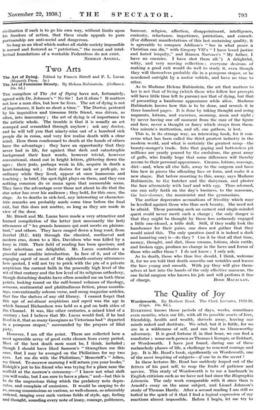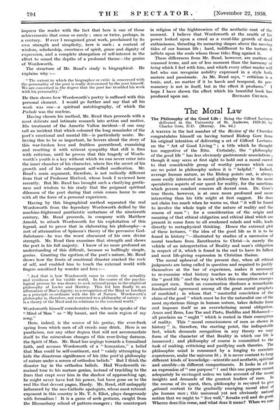The Quality of Joy
Wordsworth. By Herbert Read. The Clark Lectures, 1929.30. (Cape. 10s. ad.). Wordsworth. By Herbert Read. The Clark Lectures, 1929.30. (Cape. 10s. ad.).
EVERYONE knows those periods of days, weeks, sometimes even months, when our life, with all its possible assets of love, friendship, health and wealth, shrivels away, leaving our minds naked and destitute. We rebel, but it is futile, for we are in a wilderness of self, and can find no blameworthy adversary. It is good fortune if, in that hour, we can find a comforter ; some such person as Thomas it Kempis, or Eckhart, or Wordsworth. I have just found, during one of these melancholy phases of life, a challenge to renewed courage and joy. It is Mr. Read's book, significantly on Wordsworth, one of the most inspiring of subjects—if one be in the secret In these lectures Mr. Read has suddenly leaped out of the fetters of his past self, to reap the fruits of patience and service. This study of Wordsworth is to me a landmark 'in English criticism such as we have not had since the Biographic Literaria. The only work comparable with it since then is Arnold's essay on the same subject, and Lionel Johnson's study of Thomas Hardy. After a second reading I am still so bathed in the spirit of it that I find a logical expression of my reactions almost impossible. Before I begin, let me try to
impress the reader with the fact that here is one of those achievements that come so rarely ; once or twice, perhaps, in a century. If ever I recognized great work, proclaimed by its own strength and simplicity, here is such ; a content of wisdom, scholarship, sweetness of spirit, grace and dignity of expression, and a complete abnegation of self-interest in the effort to sound the depths of a profound theme—the genius of Wordsworth.
The structure of Mr. Read's study is biographical. He explains why :-
" The extent to which the biographer or critic is concerned with the personality of the poet is really determined by the poet himself. We are concerned in the degree that the poet has troubled his work with his personality."
He then shows how Wordsworth's poetry is suffused with this personal element. I would go further and say that all his work was one—a spiritual autobiography, of which the Prelude was the nucleus.
Having chosen his method, Mr. Read then proceeds with a most delicate and intimate research into action and motive. His treatment of the Annette Vallon incident—if one may call an incident that which coloured the long remainder of the poet's emotional and mental life—is particularly acute. Be- lieving this to be so important, he hovers about the story of this war-broken love and fruitless parenthood, examining and resetting it with reticent sympathy that still is firm with criticism, until he proves that this tragedy of Words- worth's youth is a key without which we can never enter into the inner chamber of his character, where lies the secret of his growth and of his subsequent self-willed ossification. Mr. Read's main argument, therefore, is not radically different from that of Professor Herford, whose book I reviewed here recently. But Mr. Read has brought such a clarifying gentle- ness and wisdom to his study that the poignant spiritual dilenuna of the poet during that crisis comes home to one with all the force of a personal experience.
Having by this biographical method separated the real Wordsworth from the legendary Wordsworth deified by the machine-frightened pantheistic unitarians of the nineteenth century, Mr. Read proceeds, in company with Matthew Arnold, to attack Wordsworth for his exploitation of this legend, and to prove that in elaborating his philosophy—a Sort of attenuation of Spinoza's theory of the pervasive God- Substance—he was the worst obscurant of his own divine strength. Mr. Read then examines that strength and shows the poet in his full majesty. I know of no more profound an understanding of this difficult, because so bafflingly simple, genius. Granting the egotism of the poet's nature, Mr. Read shows how the frosts of emotional disaster cracked the rock of self, and enabled him to touch the external world with fingers sensitized by wonder and love :—
" And that is how Wordsworth came to create the actuality and vividness of his visible world. In the course of the psycho- logical process he was drawn to seek rational props in the empirical philosophy of Locke and Hartley. This led him finally to an affirmation of Man's dignity, to a recognition of the Mind or Intellect as a principle co-ordinate with the life of Nature. Wordsworth's philosophy is, therefore, not restricted to a philosophy of nature : it is a theory of the Mind and its relations to the external world."
Wordsworth himself corroborates this, where he speaks of the "Mind of Man" as "My haunt, and the main region of my song."
• Here, indeed, is the source of his genius, the ever-fresh spring from which men of all creeds may drink. Here is no pantheism, nor any other dogma that, will not accommodate itself to the miraculous changes of this ever-living daemon, the Spirit of Man. Mr. Read has urgings towards a formalized faith, and accuses Wordsworth of a' " humanism," a belief that Man could be self-continent, and " vainly attempting to hide the disastrous significance of his (the port's) philosophy of nature under a screen of orthodox beliefs." But I think the disaster lay in the orthodox beliefs. Had Wordsworth
re- mained true to his mature genius, instead of truclding to the fears that crept over him in the shadow of approaching age, he might never have lost his power, but have gone on to the end like that devout pagan, Hardy. Mr. Read, still unhappily influenced by the neo-Catholic apologists, whose most reticent exponent in this country is Mr. T. S. Eliot, plays dangerously with formalism ! It is a game of arch gestures, caught from the Bloomsbury school of pattern-mongers ; the counterpart
in religion of the highbrowism of the aesthetic cant of the moment. I believe that Wordsworth at the zenith of his power looked upon a creed as a coral-like growth of dead enthusiasms, thrusting its menacing shapes above the moving tides of our human life ; hard, indifferent to the torture it inflicts upon the souls whom those tides fling against it.
These differences from Mr. Read, however, are matters of reasoned terms, and are of less moment than the harmony of being which I feel with him, and which every other reader will feel who can recognize nobility expressed in a style both austere and passionate. As Mr. Read says, " criticism is a tonic, and, no matter if it be harsh and temporal, its per- manency is not in itself, but in the effect it produces." I hope I have shown the effect which his beautiful book has



















































































 Previous page
Previous page